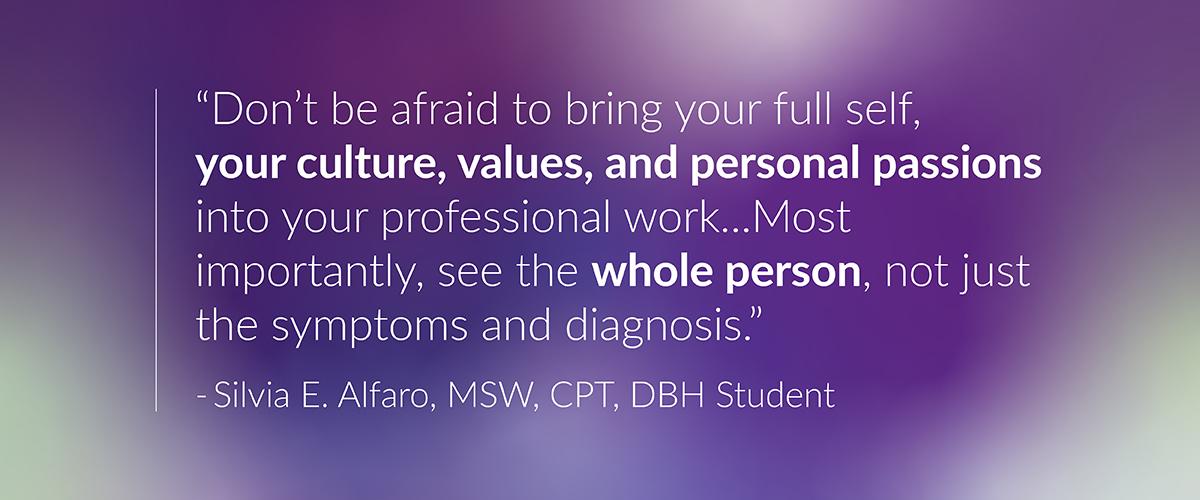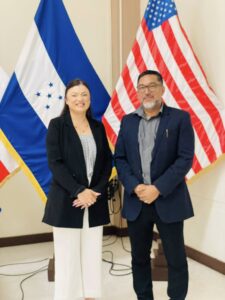 DBH Student, Silvia E. Alfaro, advances integrative health and champions inclusion across communities in El Salvador.
DBH Student, Silvia E. Alfaro, advances integrative health and champions inclusion across communities in El Salvador.

DBH student Silvia E. Alfaro, MSW, CPT is bringing integrative health and inclusion to the forefront in El Salvador, where disability is too often absent from public health conversations. Through advocacy, community collaboration, and insights gained from her DBH coursework, Silvia is creating safe spaces that center Latino voices and lived experiences, especially for individuals and families navigating disabilities. Her work demonstrates how cultural humility, trauma-informed care, and systems-level leadership can come together to inspire meaningful change and elevate health equity on a global scale.
“I was deeply inspired by my passion for creating spaces where Latino voices and lived experiences are centered, especially for individuals and families navigating disabilities,”
shared Silvia. “In El Salvador, disability is often underrepresented (language, access to education, resources, caregiver support) in health conversations, and I felt called to bring an integrative health perspective that bridges cultural understanding, community needs, and practical solutions. My own work in trauma-informed care and holistic medicine has shown me how essential it is to view health and inclusion as intertwined. However without my mental health advocate and friend Eduarto Aquino and Psychologist Tatiana Mendoza whom resides in El Salvador this would not be possible as they have created “Matices de Inclusion” – Shades of Inclusion – a place that creates safe spaces for individuals and families navigating disabilities.”
Reflecting on how her DBH coursework prepared her for this work, she explained, “These [CGI DBH] courses gave me the tools to frame my speech (TED Talk style) not only around clinical or integrative interventions, but also within a leadership and systems-change mindset. I was able to use my leadership style (Transformational) discussed in class. I was able to integrate evidence-based strategies with cultural humility, making sure my message addressed structural barriers as well as community strengths from Health Equity. The coursework also helped me feel confident in blending behavioral health, integrative health care, and advocacy in a way that resonated with a diverse audience and Salvadoran health leaders who attended this activity.”
When asked about the most impactful moment of the event, Silvia recalled, “Personally, the most impactful moment for me was witnessing the audience’s emotional response, seeing participants share personal stories like, ‘We all have a story,’ ‘I am blind,’ ‘We need better language when speaking about disabilities.’ Everyone asked thoughtful questions and connected with each other beyond the activity. Professionally, it reminded me that change often starts in these shared spaces where people feel seen, valued, heard, and empowered to take action. 130 attendees impacted me!”
Silvia’s advice to fellow DBH students is straightforward and heartfelt:
“Start by listening and engage deeply with the communities/population you want to serve, knowing that we all have a story to tell or not tell, but makes as who we are. Let their needs, stories, and priorities shape your approach. Use the tools, the Biodyne Model from the DBH program, not just to implement interventions, but to advocate for systemic changes that remove barriers to care. And don’t be afraid to bring your full self, your culture, values, and personal passions into your professional work. That authenticity is what builds trust and drives meaningful impact. Most importantly, see the whole person, not just the symptoms and diagnosis.”
Learn more about the Doctor of Behavioral Health (DBH) program and how it’s shaping leaders who address health disparities worldwide, at cgi.edu/dbh.






























